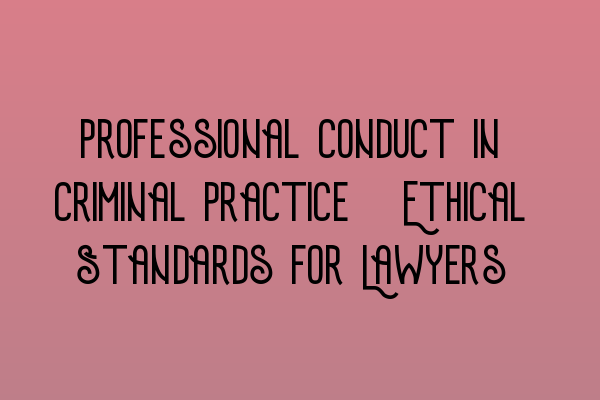Professional Conduct in Criminal Practice: Ethical Standards for Lawyers
As a criminal law practitioner, it is imperative to uphold the highest ethical standards in your professional conduct. Lawyers play a crucial role in the criminal justice system, and their conduct has a direct impact on the administration of justice. This blog post will explore key ethical standards that should guide lawyers in their criminal practice.
Integrity and Honesty
Integrity and honesty are paramount in the legal profession. Lawyers must maintain their integrity at all times and represent their clients with honesty and candor. The duty to be truthful extends to all aspects of the legal process, including interactions with clients, court officials, and opposing counsel.
SQE 1 Practice Exam Questions can help aspiring lawyers familiarize themselves with the type of ethical questions they may encounter in the SQE 1 exam.
Confidentiality and Privilege
Confidentiality is a cornerstone of the lawyer-client relationship. Lawyers must protect and maintain the confidentiality of their clients’ information, unless expressly authorized or required by law to disclose it. Legal professional privilege ensures that clients can fully disclose the details of their case without fear that the information will be used against them.
To learn more about SQE 2 and preparation courses, you can visit SQE 2 Preparation Courses.
Conflict of Interest
Lawyers must be vigilant to avoid conflicts of interest that may compromise their professional judgment or unduly influence their representation of clients. A conflict of interest arises when a lawyer’s personal, financial, or professional interests conflict with their duty to act in their clients’ best interests. It is crucial to identify and address potential conflicts with utmost diligence.
Competence and Diligence
Competence and diligence are essential qualities for lawyers practicing criminal law. Lawyers should have the necessary knowledge, skills, and experience to handle their clients’ cases effectively. They must also commit to ongoing professional development to stay abreast of developments in criminal law and procedure.
Want to test your knowledge? Take a look at SQE 1 Practice Mocks FLK1 FLK2 for practice questions that can help you assess your readiness for the SQE 1 exam.
Fairness and Respect
Lawyers must treat all individuals involved in the criminal justice system with fairness, courtesy, and respect. This includes clients, witnesses, victims, court officials, and opposing counsel. Demonstrating professionalism and respect fosters trust in the legal process and contributes to a fair and just outcome.
Conclusion
Upholding ethical standards is essential for lawyers practicing criminal law. Integrity, confidentiality, avoidance of conflicts of interest, competence, diligence, fairness, and respect are key principles that guide professional conduct. By adhering to these ethical standards, lawyers contribute to the effective functioning of the criminal justice system and ensure the delivery of justice to their clients.
For SQE 1 and SQE 2 exam dates, visit SRA SQE Exam Dates.
